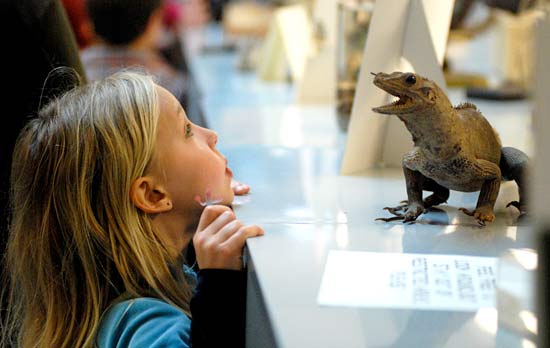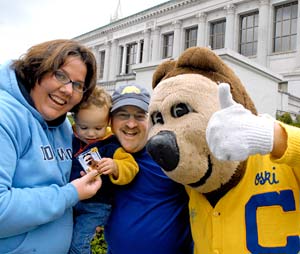 A young Cal Day visitor regards one of the campus's four-legged denizens with equanimity. (Peg Skorpinski photo)
A young Cal Day visitor regards one of the campus's four-legged denizens with equanimity. (Peg Skorpinski photo)Cal Day: It's about the dazzle
Every April, Berkeley opens its doors to the community — and 35,000 people walk through
| 09 April 2009
Berkeley's annual open house, which runs from 8 a.m. until 5 p.m on Saturday, April 18, will offer hundreds of educational and entertaining activities for people of all ages. Full information and a detailed program for the all-day event, which is expected to draw 35,000 people to campus, can be accessed at calday.berkeley.edu.
BERKELEY — What would Charles Darwin think of how the world has changed since he made his epic voyage on the Beagle and published his theory of evolution?
To try to answer that question, on Saturday, April 18, Berkeley professor of integrative biology (and Darwin expert) Jere Lipps will retrace the famous journey, pausing to assess the current condition of the places Darwin visited on his voyage, then wrote about in his masterwork, The Origin of Species, which was published 150 years ago.
And his audience? Anyone who's even remotely curious: It's just one Darwin-related event out of several being prepared for Cal Day 2009. Adventurers eager to learn more about how such scientific breakthroughs happen can also examine specimens relating to the great man's paleontological, biological, and cultural explorations at the Berkeley Natural History Museums. And they can learn how to read his letters and books — including the full text of The Origin of Species — online.
In recognition of both the National Year of Science and the International Year of Astronomy, science will play an even bigger role than usual at Cal Day 2009, with everything from racing robot cars to the latest in nanotechnology on display. But the program also offers dance, music, and theatrical performances — plus lectures, demonstrations, and hands-on activities — all designed to dazzle incoming students, their families and friends, and visitors from neighboring communities.
 Another lifelong Cal booster reaches out to Oski. (Peg Skorpinski photo)
Another lifelong Cal booster reaches out to Oski. (Peg Skorpinski photo)This is the only day of the year that some of the campus's museums, including Paleontology and Vertebrate Zoology, throw open their doors and show off fossils, birds, bugs, and animals (some live, most preserved) from their extensive collections. Admission to all campus museums will be free on Cal Day.
Barack Obama's name attains a high Cal Day profile this year, popping up here at a historians' panel on the president's election and its place in American history, and there at a panel of political scientists discussing the way YouTube, blogs, texting, and other new media, used to dramatic success by the Obama campaign, are changing politics.
We're kidding!
Visitors below legal voting age, meanwhile, will be able to write letters (postage supplied) to Obama, and hear other kids' letters to him that have been compiled in the new book Thanks and Have Fun Running the Country, read by its editor, a San Franciscan who operates a tutoring and writing center in the Mission District.
In fact, Cal Day is paradise for kids, rife as it is with dinosaurs, creepy crawlies, live animals, and puppet shows at various locations. A Science@Cal passport for 6- to 12-year-olds, available at participating departments, can be stamped at each event.
Children can learn how DNA is chemically extracted from organisms for research — and then extract some from their own cheek, and take it home in a necklace. They can try their luck at lizard-noosing, which scientists use to capture live specimens. And up at the Lawrence Hall of Science they can hang with the blood-sucking leeches and slime-making slugs of the Animal Grossology exhibit, sit back and watch the stars at the planetarium, and take part in hands-on science all day long, all for free.
Appearances by storytellers, children's-book authors, and Peter Rabbit himself, along with music and art activities, will bring literature to life at the free children's-book fair in Tolman Hall, where the Obama letter-writing will take place.
Big names, hot topics
For non-kids, Cal Day will offer the chance to catch some of the big names on Berkeley's faculty talking about some of the hottest topics of the current age. Among them are Dacher Keltner, a psychologist and co-director of the Greater Good Center, who starts with the provocative question "Are We Wired for Good?" to discuss the human nervous system's capacity for compassion, gratitude, and happiness.
Another is Dan Kammen, a professor in the Energy and Resources Group, who in one of several events touching on aspects of climate change will bring his renewable-energy expertise to bear on the controversial subject of cars' role in a clean-energy future. Other experts will take up issues like "Does a green lawn soak up carbon dioxide?" and "How will our coasts and islands be affected by global warming?"
The sports-minded can watch Cal's baseball team take on the University of Oregon, scope out next fall's football team in its last spring practice, see the women's tennis team play arch-rival Stanford, or preview yoga and martial-arts programs.
For the musically inclined, choices will range from flute and orchestral concerts to bagpipe and electronica demos to carillon recitals from the top of the Campanile. Students will perform dance concerts, taiko drum shows, and a full run-through of the musical comedy City of Angels.
And finally, for everyone, there's Oski, Cal's beloved Bear mascot, who will spend Cal Day dispensing hugs and handshakes. Look for him in his lair on the east side of Memorial Glade, better-known this one day every year as Oskiland

